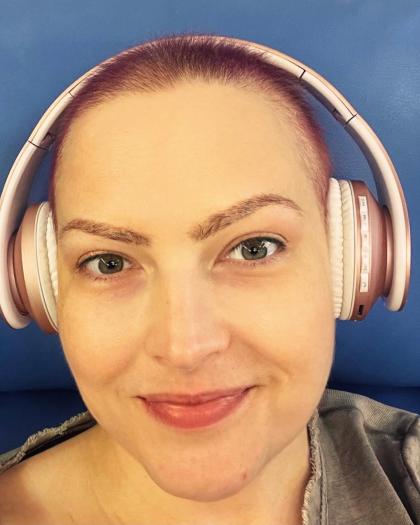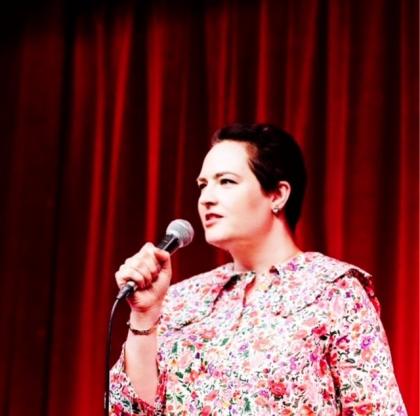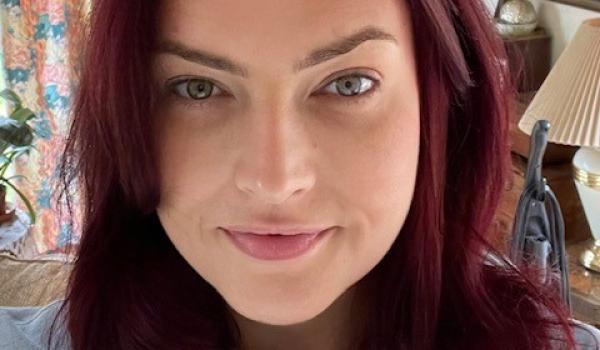I was on holiday with my sister when I started to feel really unwell. I thought I had food poisoning, but after 48 hours I was still really sick and in absolute agony with tummy pain. My sister was getting worried, so decided to cut the holiday short and drive me back to her house. By the time we got home she insisted we go to A&E so I could see a doctor in person.
I had to say goodbye to her at the door of A&E as covid restrictions were in place, and it was then that I started to realise I must be really ill. The nurse admitting me called a doctor immediately and I was taken to a ward – despite having expected to wait hours as you usually do in A&E.
I was in hospital for a few days getting tests but then I was allowed to go home. They told me to come back the next day for a CT scan, but thanks to the pain meds I was on I thought the worst of it was over. I knew something was wrong when having the CT because I overheard the radiographer call for a surgical consult.
At this point they took me back up to a ward and readmitted me. I still thought it was something minor – maybe gallstones. I thought I was far too young to be diagnosed with ovarian cancer.
Tumours
The next morning, I thought I’d be told I could go home, but then a doctor and specialist nurse took me into a room and explained they’d found numerous large tumours in my abdomen. That was really difficult because I was alone.
Because the tumours were so widespread, they didn’t know yet that it was ovarian cancer, but I was told the outlook wasn’t good and that I had limited treatment options. When I was finally told I had ovarian cancer I actually felt somewhat hopeful as we could start to plan my treatment. My tumours were growing really quickly so I started chemotherapy immediately which went on for around five months.
The chemo was successful enough for me to have my operation. This ended up being incredibly extensive and a really traumatic experience which is one of the reasons I want to share my story.

The impact
Something that never occurred to me when I got my original diagnosis were the mental health implications. We hear about brave cancer stories, but we rarely hear about those who are living with trauma and PTSD like me.
I don’t think there’s awareness of the severity of ovarian cancer treatment at late stages, and therefore an understanding of the need for mental health support just isn’t good enough.
Two weeks after my surgery my partner of ten years left me, which was extremely difficult and unexpected. Some of that was to do with losing my fertility, and I think part of it was being so unprepared for what I was about to go through and the extent of ovarian cancer treatment.
All of my doctors are fantastic people, but there’s not enough awareness of ovarian cancer, which meant I had no idea about what I was going to experience – nobody told me. This made me feel even more alone.
The unknown
I didn’t realise I was going to be conscious when I went into the theatre, which meant I was in a very vulnerable place, in just a gown having taken huge amounts of bowel prep with ten male surgeons weirdly introducing themselves to me. I just didn’t know that’s how it was going to go.
After my surgery I woke up on a maternity ward as that’s where they put gynaecological patients at my local hospital. I would have preferred to have been in any other ward in the hospital having just come out of surgery that meant I lost my fertility.
Maybe it’s not spoken about enough because it’s a gynae cancer, but I think people need to know. If my loved ones and I had a better idea of what we were about to go through, we would have been better mentally prepared.
I really want other people who are in my position to know they’re not alone in their experiences, and that other people are going through this too.
After surgery I went back onto chemo and I'm now on olaparib and a small dose of chemotherapy which I will have to have for two years.
Comedy
My comedy routine has allowed me to take these traumatic things and make them funny. It is funny that these really weird things have happened to me, and they’re not explored publicly for some reason. We need to start being comfortable having these conversations.
I thought my situation was unique and I had been really unlucky, but as soon as I started to talk about it, I started to have conversations with other women and family members of people who had exactly the same experience and trauma as me.

I started to do stand-up because I wanted to find a way of telling my story and getting across the reality of my experience that was relatable. The audience find it funny but I’m also realising they are really unaware of ovarian cancer. The more we speak about it the more we can support people better and be better prepared if it happens to us.
Unless we start talking about these things it won’t get any easier for anyone newly diagnosed with ovarian cancer.
Target Ovarian Cancer
It was only when I started to feel better in myself and less in shock that I found Target Ovarian Cancer. Before that I didn’t know ovarian cancer charities existed. It would have been great to know that there was somewhere for me to go that could support me from the beginning.
If I’d been told about Target Ovarian Cancer at my first oncology meeting, I would've felt less blind. When I found you, I suddenly felt I was less alone.
I also wish I could've shared links and sent the stories on your website to my friends and family. It would've helped me and them understand what was about to happen to me.
Watch Kate’s stand-up act and follow her on Instagram: @kate_isfunny
If you’ve been affected by this story and would like to speak to a specialist nurse, you can call our dedicated support line on 020 7923 5475 or contact us: [email protected]. We're open from 9am until 5.30pm, Monday to Friday.
If reading this story has helped you, join the Ovarian Cancer Community to connect with more people affected by ovarian cancer: www.targetovariancancer.org.uk/onlinecommunity



